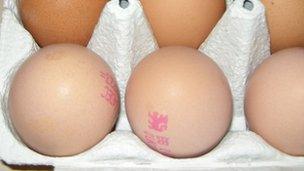Eggs past best before date still safe to eat, says FSA
- Published

The FSA hopes the advice will see fewer eggs thrown away
British eggs can still be eaten two days after their best before dates have passed, the Food Standards Agency has said in revised guidance.
Previous advice said consumers should avoid eggs after this period because of salmonella food poisoning risks.
The FSA, which issued the advice, external as part of a drive to cut food waste, says salmonella rates have fallen in recent years.
It stressed eggs should be cooked and not be eaten past their use by dates.
The new advice states that "eggs can be eaten after their best before date, as long as they are cooked thoroughly until both yolk and white are solid, or if they are used in dishes where they will be fully cooked, such as a cake".
"Salmonella contamination levels in UK-produced eggs are low, and salmonella is killed by thorough cooking," the FSA said.
A spokesperson for the FSA added: "Food past its best before does not automatically mean that it's unsafe, but it might mean the texture or flavour is less good.
"There is confusion amongst consumers, but there is an easy distinction to be drawn between the two: Best before dates deal with food quality, whereas use by dates deal with food safety."
The guidance stressed that eggs that had passed their use by dates still should not be used as they could put health at risk.
In 1988, former health minister Edwina Currie caused a collapse in sales after stating that "most of the egg production in this country sadly is now infected with salmonella".
The claims were rubbished at the time, and a 2003 survey by the FSA found that just 0.3% of UK eggs contained any trace of salmonella.
- Published6 December 2011
- Published13 May 2011
- Published7 January 2011